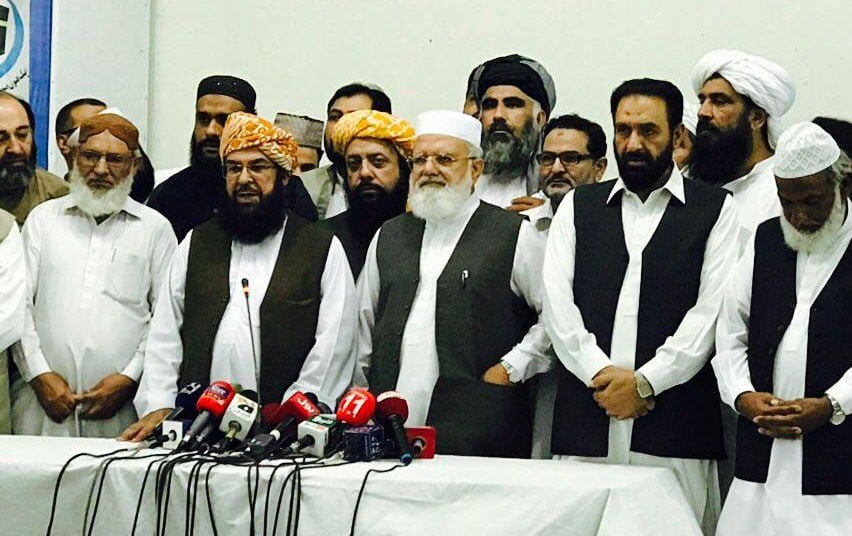
The JUI-F is reaching out to the leaders of component parties of the MMA to discuss the restoration of the electoral alliance for the upcoming polls but why

As part of its preparation for the upcoming general polls scheduled next year, the Jamiat-e-Ulema-e Islam-Fazl (JUI-F), one of the largest Islamist parties, has been making efforts to unite the religious parties representing different sects and revive the Muttahida Majlis-e-Amal (MMA). This was a six-party electoral alliance of six religious parties, formed for the 2002 general polls.
To reach out to the leaders of component parties of the MMA to discuss the restoration of the electoral alliance that scored major electoral victories in 2002, the JUI-F has formed a committee, headed by its central leader and Senate’s Deputy Chairman, Maulana Abdul Haidri. It has met Maulana Samiul Haq, head of the JUI-S, Liaquat Baloch, the Jamaat-e-Islami’s central secretary general, Allama Sajid Ali Naqvi, head of the Tehreek-e-Islami Pakistan, Professor Sajid Mir, head of the Markazi Jamiat Ahle Hadith, Hafiz Ibtisam, head of Jamiat Ahle Hadith, Pir Ijaz Hashmi and Pir Mahfooz Shah Mashadi, leaders of the two factions of the Jamiat-e Ulema Pakistan (JUP), in recent days.
Maulana Amjad Khan, the JUI-F’s central deputy secretary general, says the mainstream religious parties have agreed to revive the MMA. "After organising the successful centenary celebration of the party in Peshawar in April, the party’s central shura had decided to start preparations for the upcoming polls, and for forging an electoral alliance. Religious parties which were part of the MMA are our priority," Khan tells TNS.
Khan says the main objective is to unite the now divided vote bank of religio-political parties and the alliance will show better results than 2002.
In the 2002 general polls, the MMA formed the government in KP alone and joined the coalition government with the Pakistan Muslim League-Quaid (PML-Q) in Balochistan. The alliance won most of the National Assembly seats from FATA and managed to win a number of seats from Karachi and Hyderabad in Sindh.
Analysts believe the success of the MMA can be attributed to the region’s geopolitical significance and military-civilian relations. Nazish Brohi, a political scientist who has authored The MMA Offensive: Three years in power, 2003-2005 says that the MMA victory in KP and Balochistan happened in the context of a democratic hiatus with a military ruler endorsing them as a legitimate representative, the opposition being in exile, and immediate panic after the US bombardment in neighbouring Afghanistan. "It was a complete triangulation for them."
However, she believes, it is a changed scenario now where religio-political rightwing as a whole is frantically trying to keep itself relevant. "But the problem for their relevance was not much about democratic relevance; it is more about their relevance to the establishment and it is now diminished," Brohi tells TNS.
The committee members also met the leaders of the proscribed Jamaat-ud Dawa (JuD) at the latter’s headquarters in Lahore. But the JUI-F leader says that the JuD does not take part in parliamentary politics and meeting with its leaders was to highlight the Indian government’s atrocities in Kashmir.
The committee did not consult violent sect-based religious groups, such as the proscribed Ahle Sunnat Wal Jamaat, the Pakistan Sunni Tehreek and the Majlis-e-Wahdat-e Muslimeen, to include them in the electoral alliance. However, sources say, after forming a proper organisational structure of the MMA, the alliance leadership will decide about their inclusion.
However, sources familiar with the developments say there are differences between the two key religious parties -- the JUI-F and the JI -- over the allotment of tickets in KP. In 2013, all religious parties agreed to revive the MMA but because of the JI’s pressure to allot them 50 per cent seats in the KP, the alliance was formed minus the JI.
According to a JI leader, the JUI-F manipulates the MMA in decision-making and sometimes its leaders in KP and Balochistan exhibit rigid attitudes towards their allies in the alliance. "The JI is the country’s most powerful and influential religious party and the JUI-F treats it like the JUI-S or JUP," a JI leader, requesting anonymity, tells TNS. He says that even in the 2002 general polls, the JUI-F did not award any ticket to the JI from Balochistan from the "winning seats".
A section of analysts are of view that the ruling Pakistan Muslim League-Nawaz’s top leaders requested the JUI-F to revive the MMA to give tough time to the Pakistan Tehreek-e-Insaf in KP and Punjab.
Analysts also believe that the MMA had a long term radicalising influence on the KP. "While the concrete steps they took were short-lived and overturned later, for example, the prohibition of singing and dancing at Dabgari area of Peshawar, the environment they created by harassing and evicting musicians from there, raiding music gatherings and threatening to throw singers in the Kabul River created the context under which the militants then bombed DVD shops and targeted and killed musicians and performers," says Brohi.
She says the MMA government paved the way for the Taliban takeover in Swat and has gotten away with it.